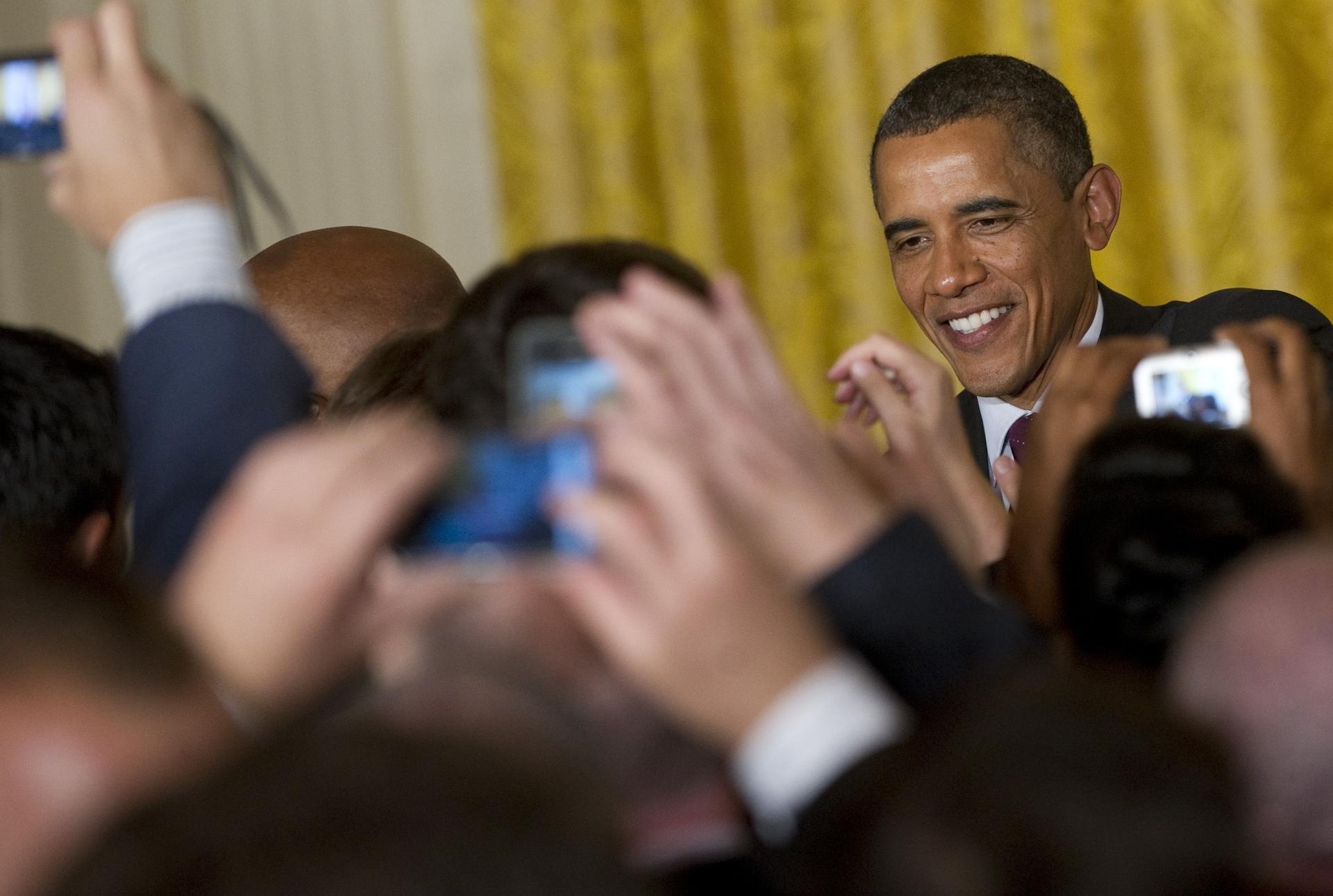Deciphering the truth and consequences of Obama’s global LGBT policy
US President Barack Obama greets guests during an event honoring LGBT (Lesbian,Gay, Bisexual and Transgender) Pride month in the East Room of the White House in Washington, DC, June 29, 2011.
President Obama and Secretary of State Clinton used a pair of political tools — an official memo and a speech — to dramatic effect Tuesday, pushing rights for sexual minorities higher on the administration’s political agenda while provoking a global discussion.
The question this week is whether the joint messages, interpreted by many world leaders and media as a warning to countries who criminalize homosexuality, mean the United States is truly ready to play hardball when it comes to gay rights.
The US State Department under Obama and Clinton has invested substantially in promoting LGBT tolerance through its diplomats and embassies, but Tuesday was the first time its approach had been mapped out.
“Being gay is not a Western invention,” Clinton told an audience of international ambassadors and government officials at the United Nations in Geneva, acknowledging that America's record on LGBT is flawed. “It is a human reality.”
Obama’s memo, released to coincide with Clinton’s rousing speech, was widely received as an aggressive step toward advancing LGBT rights in countries that have long resisted pressure from advocates to reform their laws. It followed just weeks after UK Prime Minister David Cameron said that "British aid should have more strings attached" with respect to LGBT rights.
The memo read in part, “Agencies involved with foreign aid, assistance, and development shall enhance their ongoing efforts to ensure regular Federal Government engagement with governments, citizens, civil society, and the private sector in order to build respect for the human rights of LGBT persons.”
Though it did not state that countries that criminalize homosexuality would necessarily suffer a reduction in aid, the mention of aid and USAID led a number of major news outlets to focus on the Obama administration’s use of foreign aid to shape recipients’ policies toward their LGBT citizens.
The New York Times, however, warned against overreaction, reporting that “Neither Mr. Obama nor Mrs. Clinton specified how to give the initiative teeth.”
But coupled with Clinton’s remarks, the directive helped put the world’s eyes on countries like Nigeria, Kenya and Pakistan — key American aid recipients that criminalize homosexuality.
It is still unknown whether Obama advocates cutting aid to such countries, though he has pledged additional funding to promoting rights abroad. Clinton announced an initial $3 million for a Global Equality Fund, which a senior State Department official later confirmed would go toward countries without legal protections for LGBTs.
“There are around 80 countries in the world where LGBT status or conduct is still criminalized, so certainly, those 80 countries would be priority areas,” the official said.
Nigeria’s minister of information Labaran Maku defended the Nigerian senate’s November passage of a bill criminalizing same-sex marriage and his country’s right to make decisions without US influence.
“Between Europe, America and Africa there is a huge culture gap,” he said. “Some of the things that are considered fundamental rights abroad also can be very offensive to African culture and tradition and to the way we live our lives here.”
Pakistan's Foreign Office spokesman Abdul Basit had a similar message.
“We are of the view that these are sensitive issues and sometimes they directly clash with peoples’ and counties’ cultural and religious ethos," he said.
LGBT advocates' opinions ranged from delighted to cautiously optimistic, and acting executive director of the International Gay & Lesbian Human Rights Commission Jessica Stern lauded the administration’s focus on LGBT equality but questioned the impact.
“The 'Presidential Memorandum' and speech by Secretary Clinton make clear that LGBT rights are not a mere afterthought but a carefully considered component of US foreign policy," she said. "To be clear, there were no indications of tying aid to conditions or of cutting aid."
The defensive postures of Nigerian and Pakistani leaders indicated the newly defined policy hit some of its intended targets, however.
And it is clear the administration is offering incentives to countries that get on board with its initiative. But future aid decisions for countries like Nigeria, Kenya and Pakistan will reveal whether there will be negative financial consequences for refusing to do so.
The article you just read is free because dedicated readers and listeners like you chose to support our nonprofit newsroom. Our team works tirelessly to ensure you hear the latest in international, human-centered reporting every weekday. But our work would not be possible without you. We need your help.
Make a gift today to help us reach our $25,000 goal and keep The World going strong. Every gift will get us one step closer.
